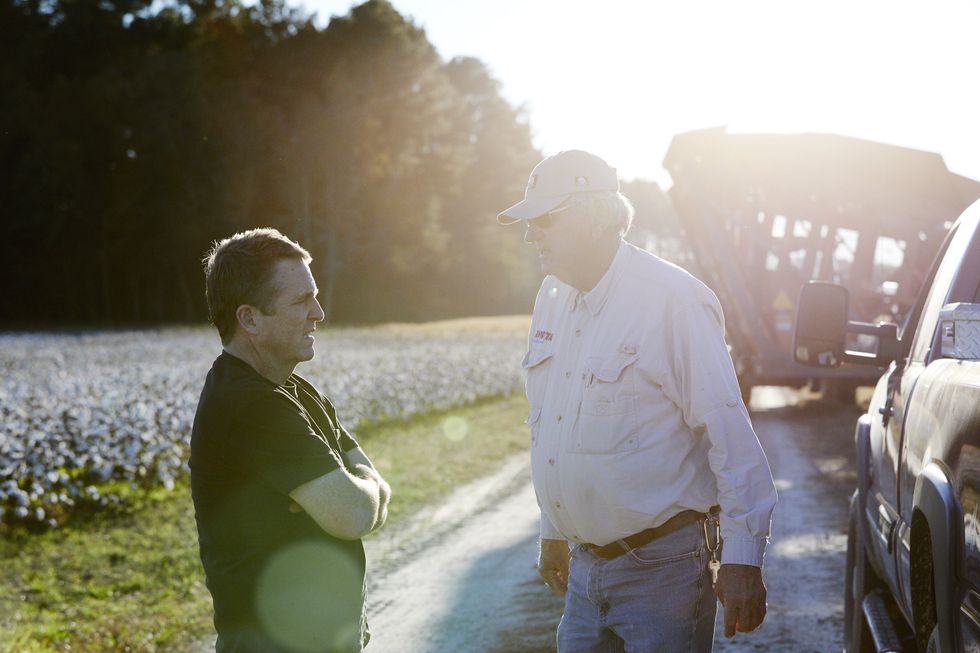
American Giant

American Giant founder Bayard Winthrop wants America to make great things again
American Giant launched in 2011 with a plan as focused as it was ambitious: to create the greatest hooded sweatshirt known to man — and to do so entirely in the USA, from growing the cotton to final cutting and sewing.
Almost a decade and a half later, founder Bayard Winthrop's bet seems to have paid off, if glowing reviews like "I've been wearing this hoodie to work for ten years" are any indication. With success has come expansion; the San Francisco-based apparel maker now offers everything from polos and jeans to outerwear and socks.
But for Winthrop the mission to revitalize American manufacturing has always been bigger than one company. As the downsides of globalization become increasingly apparent, Winthrop's message has found receptive listeners on both sides of the partisan divide. Among them is United States Trade Representative Katherine Tai, who last March sent two senior advisers to tour American Giant's supply chain in the Carolinas.
Winthrop recently spoke with Align to discuss competition with China, the need for manufacturing jobs, and the wisdom of the American people. This interview has been edited and condensed for brevity and clarity.
Editor's note: American Giant is a sponsor of BlazeTV's "The Glenn Beck Program."
It's not a question of: Is globalization going to continue? It is. But what form is it going to take? Our competitors are asking this. China, for example, has said quite clearly, look, the making of things is going to be very core to our policy. And so we're going to have a relatively protectionist system that allows us to make things really, really well. We're going to protect that ability because we believe it's a competitive advantage, and we think it's important to our communities that people have work.
The U.S. has done the opposite of that. The U.S. has said that's not really important. What's important is that we have really, really cheap stuff that we can buy.
When you put production, the making of things, at the center of policy, in my judgment, really good things begin to accrue.
We have put at the very center of our economic and trade policy a neoliberal worldview that says everything ought to be in service of consumption. In other words, we ought to conduct trade policy in a way that puts as its highest objective ensuring that consumers have more and more choice at cheaper and cheaper prices.
Maybe I'm being naive about this, but I think in its original form, this kind of neoliberal view was pretty widely shared. It was as much Bush as it was Clinton. There was a bet early on that if we do this, not only will it benefit the consumer, but we'll open up markets in places like China and bring those people into the first world order. And they're gonna become trading partners of ours and strategic partners of ours and no longer foes.
I think that bet was one of the worst bets of the last 40 years of U.S. foreign policy. China today is a much more intractable foe than it was 40 years ago and is clearly not aligned with our foreign policy objectives. But I think the bet came from a genuine place. I think the people who were advancing that policy genuinely thought they were doing the right thing.
I am a supporter of increasingly protectionist, production-focused industrial policy. I think it's important for a whole host of reasons. I think it's important from a national defense perspective, I think it's important from an economic perspective, all these things.
When you put production, the making of things, at the center of policy, in my judgment, really good things begin to accrue. You have minimum wage pay that grows; you've got jobs that move back into communities that really need them. You've got an alignment with our values, with the production of the goods that we're consuming, all these things.
And the other thing that I think is overlooked is that you'll begin to reignite innovation and automation and investment.
Because if you're operating within the constraints of the U.S. you'll realize pretty quickly that it's more expensive. So how do we figure out ways to innovate to make ourselves more competitive? An unintended consequence of offshoring in the textile industry it that it's really retarded investment in innovation and automation.
It's not enough for me to sit on my porch in San Francisco and say that the solution to the country's ills is to train a bunch of people living in South Carolina how to become engineers or Google coders. That is a bullsh**t response for people who want to feel good but are not paying attention. And the reality is that we've got to reconcile and confront the fact that we need to create good, viable, dignified work throughout the economic spectrum, throughout the skill level, throughout the educational level.
That way, we'll create an incredibly dynamic, vital, vibrant ecosystem economy, we'll heal communities, we'll bring people together, we'll have people working in common cause.
You go to work every day and you meet a bunch of people, some of whom you agree with and many of whom you don't, and you figure out a way to work together. And you get lunch together and have a coffee together. You're going to vote for so-and-so and she's going to vote for such-and-such, but it doesn't ruin the world for you; you just go on with your day.
And the more that we undermine that stuff and rip that out, the less we're going to have a stable middle class. And our industrial policy, manufacturing policy, and economic policy are not addressing that to the extent that they should. To me it's damn close to a crisis.
if you ask people in the manufacturing sector, "Are you a fan of free trade?" what they'll say is "Define free trade."
A bunch of people who shop at Walmart today can go get a flat-screen TV for $99. That's a good thing. The problem, though, is that when you put that as the objective, every other decision gets sacrificed at that altar.
We hold a bunch of values to be absolutely important. We want to protect minorities, we want to protect the environment, we want to make sure that working conditions are safe, we want to make sure that you can earn a living wage. We feel so strongly about these things that we're going to hold all of our businesses to that standard, appropriately so.
And then in the same breath, we're going to say that the people we trade with are going to have no standards, essentially. So we're going to ask you to compete with people who have none of those burdens and none of the attached costs. That's crazy. And so if you ask people in the manufacturing sector, "Are you a fan of free trade?" what they'll say is "Define free trade."
Janet Yellen has a term that she's been using that she refers to as "friendshoring," and I think there's a stimulating idea in there.
As I understand it, it's that we should trade with countries that share our values. And so define those values. That may be a free press, free and fair elections, paying people a living wage, some basic environmental standards. And if you do those things, we will open up the greatest marketplace in the world to your businesses.
Let's pick some countries like South Korea. You're a good partner. You respect the environment. You've got safe working conditions. We will open up the U.S. markets to you. If you're North Korea, or if you're China using forced labor in Xinjiang and you're sterilizing women, I'm sorry, we're not gonna trade with you.

The problem is today we've reached a point where the consumer expects to get a T-shirt for four bucks from Shein. And I'm going to say, "No. It costs $12. It's going to be a little better quality and it's going to be aligned with your values."
And she's going to say, "Yeah, I'm not doing that. I want the $4 T-shirt." And everybody always defaults to assuming the consumer won't buy a $12 T-shirt. Well, sure. But you do this all the time with environmental standards, with fuel efficiency standards for your cars, with your appliances at home, where you say we're going to ratchet up over time.
Whether you agree or disagree with it, [environmental policy] takes a long-term view. It says we've got to figure out a way to ratchet up fuel efficiency standards over time. I may disagree with it, I may agree with it, but here I am driving a car today that's quite different from the car that my mom was driving in 1980, right?
So we'll do the same with trade. We're gradually going to require that the countries that we trade with adhere to some basic standards that over time, call it a decade, are going to ratchet up the cost. You just have to have a similar, long-term view, much like China. Don't just think about this election cycle; think about where we need to be 20 years from now.
If you live in Los Angeles or San Francisco and you have a college degree, and you're a reporter, or an entrepreneur, or you work in PR, you are fine. If you have money in the stock market, you're fine. In fact, you're better than fine. But if you're not in one of those cities with a four-year degree, you are screwed. The likelihood of you passing on a better life to your kids is low. And we either can confront that and say, "That movie ends badly for us," or not.
Every person I talk to, whether it's someone on the right or someone on the left, when you have this conversation, every one of them says, "Yeah, this is wrong. We've got to fix this." Everybody gets it. And people are translating that into the way they vote.
You've had the Trump administration with [U.S. Trade Representative] Bob Lighthizer saying this. And now you've got Trade Representative Tai saying the same thing [for the Biden administration].
I think you can edge the consumer in a direction toward protecting industries that allow for thriving rural communities. If you and I had bounced through South Carolina in a car in the 1980s, you would have gone into town after town after town that had thriving industries, and there'd be a lot of different small businesses — hardware stores, grocery stores. You go through there today, it's devastation. Town after town after town after town. And I would argue that so much of the social strife you see today traces its roots to that.
We don't really even think about wisdom any more. It's just credentials and degrees. And I have a deep faith in the wisdom of the average American to begin to call bulls**t on stuff like this. And so that's why I'm hopeful. I talk to my kids about Thomas Paine all the time. This idea that the average American out there figures this stuff out better than kings and dictators do — there's a lot of truth to that.